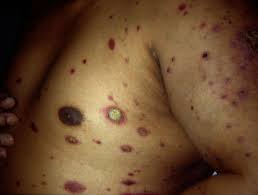
What is syphilis?
Syphilis is an infection caused by bacteria.
It also can be passed to a baby during pregnancy and childbirth and sometimes through breastfeeding.
Syphilis crisis: An ‘unacceptable American crisis’: Cases of babies with syphilis reach staggering numbers
Syphilis bacteria can stay in the body for years without causing any symptoms.
It can cause serious health problems without treatment, according to the Centers for Disease Control.
The infection develops in stages and each stage can have different signs and symptoms.
How does syphilis spread?
Syphilis usually spreads through sexual contact but can also spread from person to person through direct contact with sores, according to the Mayo Clinic.
Syphilis also can spread from a mother with syphilis to her unborn baby.
It does not spread through casual contact with objects such as toilet seats or doorknobs, the CDC said.
What are the signs and symptoms of syphilis?
There are four stages of syphilis: primary, secondary, latent, and tertiary. Each stage has different signs and symptoms.
- Primary stage
- During the stage of syphilis, there may be a single sore or multiple sores where syphilis entered your body.
- Secondary stage
- During the secondary stage, there may be skin rashes and/or sores. The rash can be on the palms of your hands and/or the bottoms of your feet .
- Latent stage
- The latent stage of syphilis hen there are no visible signs or symptoms.
- Tertiary stage
- Most people with untreated syphilis do not develop tertiary syphilis. When it does happen, it can affect many different organ systems, including the heart, brain and nervous system. This stage of syphilis is very serious and would occur 10–30 years after infection began. Tertiary syphilis could result in death.
What are neurosyphilis, ocular syphilis, and otosyphilis?
Without treatment, syphilis can spread to the brain and nervous system (neurosyphilis), the eye (ocular syphilis), or the ear (otosyphilis), according to the CDC.
Signs and symptoms of neurosyphilis can include:
- Severe headache.
- Muscle weakness and/or trouble with muscle movements.
- Changes to your mental state (trouble focusing, confusion, personality change) and/or dementia (problems with memory, thinking, and/or decision making).
Signs and symptoms of ocular syphilis can include:
- Eye pain and/or redness.
- Changes in your vision or even blindness.
Signs and symptoms of otosyphilis may include:
- Hearing loss.
- Ringing, buzzing, roaring, or hissing in the ears.
- Dizziness or vertigo.
Is there a cure for syphilis?
Yes, syphilis is curable with the right antibiotics.
One shot of penicillin will cure a person who has had syphilis for less than a year, the CDC said. More doses are needed to treat someone who has had syphilis for longer than a year.
However, treatment might not undo any damage the infection can cause, the CDC said.
Can you get syphilis again after being treated?
Yes, you can get syphilis again, the CDC said. You can get it from an untreated partner or a new partner who is infected.
What happens if you don’t get treated for syphilis?
If you don’t get treated:
- Syphilis stays in your body.
- It can damage your heart, brain, eyes, and other organs. Damage may not show for years and it could kill you.
- You might pass the disease on to other people.
How do you know if you have syphilis?
According to the Mayo Clinic, a diagnosis of syphilis is made after testing samples of:
- Blood. Because antibodies to the syphilis bacteria stay in the body for years, blood tests can find both current or past infections.
- Fluid from a sore. This test can confirm syphilis caused the sore.
- Fluid that surrounds the brain and spinal cord. This test — known as a lumbar puncture — can confirm whether nervous system problems are caused by syphilis.
Source: Palm Beach Daily News




